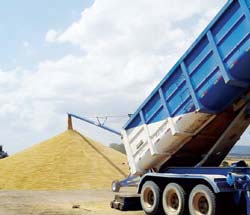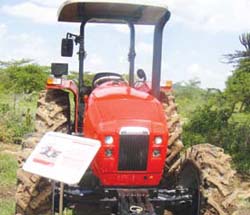Leasing Vs. Buying Agricultural Machinery
Producers are considering other options for obtaining machinery services due to increasing equipment costs, obsolescence of owned equipment, and limited sources of outside debt capital.
 When operating an agriculture business, every decision you make is important, and everything you decide to spend money on matters. It is, therefore, essential to think about what you need to purchase outright so as to ensure your company can thrive, while also being aware of what you can lease to keep operations ticking over.
When operating an agriculture business, every decision you make is important, and everything you decide to spend money on matters. It is, therefore, essential to think about what you need to purchase outright so as to ensure your company can thrive, while also being aware of what you can lease to keep operations ticking over.
Machinery and equipment expense typically represents a major cost in agricultural production. Purchasing equipment with the use of personal or business equity and loans from financial institutions or equipment manufacturers has been the typical method of obtaining machinery services for most farm operations.
Producers are considering other options for obtaining machinery services due to increasing equipment costs, obsolescence of owned equipment, and limited sources of outside debt capital. These options include leasing equipment, renting equipment, and obtaining machinery services from custom operators (i.e., custom hire).
Buying Equipment
Purchasing is the traditional method of obtaining machinery or equipment. The farm manager buys a machine using equity or a loan from a dealer or financial institution. Ownership of the machine is transferred to the farm manager, who is responsible for making loan, insurance, tax, and non-warranty repair payments.
The owner also provides the labour or hires it and pays for all variable or operating costs such as fuel, lubricants, and routine maintenance. With a purchase, the machinery is set up on a tax depreciation schedule and the owner takes depreciation deductions.
If the machine is financed with a loan, the interest component of a payment is also tax deductible. If this expensing option has not been used by other capital purchases, it can be deducted in the first year of ownership. Variable costs such as labour, fuel, and repairs as well as insurance payments are also tax deductible expenses.
Advantages characteristic of buying farm equipment include:
- Owned equipment may be easily replaced or sold at the owner’s discretion; replacing leased equipment may be more difficult.
- Owned equipment has asset value and may be used as collateral against other loans.
- Purchases do not require security deposits, although down payments to secure financing may be higher.
- Purchased equipment has no use limitations. Some leases specify the number of hours a machine may be used before a penalty is imposed.
- Increased asset value on the balance sheet.

Leasing Equipment
A lease is normally a long-term contract for the use of equipment. These contracts typically last for several years. In the case of a lease, the machinery dealer or leasing company essentially provides financing for machinery services to the person leasing the machine, but retains ownership of the machine.
The farm manager leasing the equipment typically is responsible for insurance payments, and repairs not covered by warranty as if the equipment had been purchased. The responsibilities for operating costs, including maintenance, fall on the farm manager just as they would if the machine had been purchased. The manager provides the labour for operating the machinery.
The main differences are that the financing is done with specified lease payments instead of a loan and the title to the equipment remains with the equipment dealer or leasing company. At the end of the lease, the equipment is owned by the equipment dealer and not the farm manager, however, terms often exist that allow the farmer to purchase the equipment at a market value at the end of the lease if they desire to do so. Leases generally cannot be cancelled by the lessee without penalty.
A lease or rental agreement may require a refundable or nonrefundable deposit and will likely call for payments at the beginning of the lease or rental period. In a true lease agreement, the entire lease payment is deductible. A lease deposit also is deductible for producers paying taxes on a cash basis, but the deduction must be amortized (spread over) the life of the lease. However, if the deposit is refundable, the deposit deduction will be subject to recapture on receipt of the refund. Operating costs are also tax deductible. Depreciation and interest deductions are not used.
Advantages characteristic of leasing farm equipment include:
- Lower up-front, down payment costs compared to purchasing
- Payments often are less than traditional loan payments would be
- Less liability on the balance sheet
- Equipment available for short-time needs
- Access to and use of latest technology
- Lease payments are considered production expenses for tax purposes
So, with that in mind, what are the key things you need to be aware of when choosing between buying and leasing your agricultural machinery? What are the benefits, what are the potential cons, and how can you ensure that you make the right choices to bring about business growth? Let’s look at leasing vs. buying agricultural machinery.
1. Are you happy to cover all maintenance expenses if you buy outright?
A great example to consider here is a bulldozer. You will, undoubtedly, need a bulldozer to carry out some of your business’ day-to-day functions, but given that brand new bulldozers are expensive, it may be a better option to lease than buy. This will allow you to update your bulldozer as and when necessary, upgrading to a new one without having to worry about selling your old one beforehand.
Another perk is that most hire contracts will come with some maintenance provision, so you won’t have to worry about the expenses associated with upkeep and repairs. The same can’t be said for any bulldozers you buy outright, although buying machinery does offer some benefits, including writing off parts of the machinery on your taxes and gaining equity.
2. Are you in a position to make monthly payments?
If your business’ income fluctuates, and you cannot accurately predict how much profit you are going to make from one month to the next, then maybe committing to paying off an item via a lease is not something you should contemplate. You should also consider the length of the agreement as it allows you to spread the cost over a period of time which suits your business needs – and whether this is something you can afford.
3. What is your credit situation?
It could be that, if you have a poor credit rating either personally or as a business, your purchasing options will be limited. This will also likely impact how you are able to get hold of funds, how much you might have to pay back if you are given a loan, and how your credit score looks in the long-term.
4. Leasing vs. buying a tractor
It can be difficult weighing up the options when it comes to either leasing or purchasing a vehicle outright. The key is, really, how you want to manage your business cash flow. If you want to buy a tractor outright, this would require a large upfront investment, but could mean you save money in the long run. However, leasing gives you a more flexible finance solution to securing the equipment you need without affecting your cash flow, allowing you to manage other business expenses such as employee wages, business rates, utility bills etc. Again, as we have already stated, be very aware of your finances before you make a decision because the last thing you need is to purchase a tractor and then find out that you can’t actually afford it.